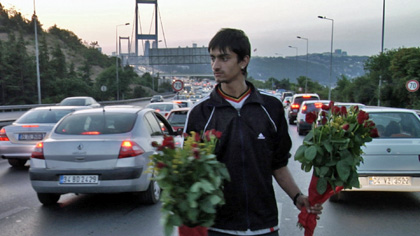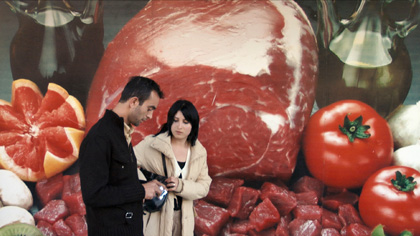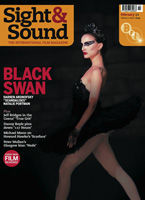Film review: Men on the Bridge

Asli Özge’s tapestry of gridlocked lives in contemporary Istanbul offers further evidence of the flowering of late neorealism in Turkish cinema, says Kieron Corless
Turkish cinema continues to flower. Latest evidence arrives in the form of Asli Ozge’s Men on the Bridge, a strangely synchronous offering to another fine recent film, 10 to 11, by Ozge’s compatriot Pelin Esmer – both debuts directed by women, using mainly non-professional actors, which started as documentary projects before morphing into features, albeit bearing clear traces of their real-life origins. Both represent the best of what’s happening in sections of their country’s cinema: a willingness to grapple with the big themes and ask the right questions, a socially engaged cinema largely untainted by didacticism, which is generally purveyed in solidly naturalist style and firmly embedded in ordinary lives and real worlds, usually at the sharp end of economic circumstance – Ozge herself has referred to a “late neorealism” in Turkish cinema.
It’s easy to speculate on the underlying causes fermenting all of this. Turkey’s suspension between tradition and modernity is as pronounced as ever, an ambiguity accentuated by its perch on the cusp of east and west (actualised here by the bridge across the Bosphorus in Istanbul). These frictions play out in the lives of Ozge’s three young male protagonists, each of whom plies his trade on the bridge. Easygoing traffic policeman Murat, a devout Muslim from a village in the east, seems out of place in Istanbul, typified by his abortive efforts with women he meets on the internet. Passive Umut, driver of a shared taxi, is the most harried figure, as he tries to scrape enough money together to satisfy his wife Cemile’s increasingly vociferous yearnings for a bigger flat. Fikret, a teenage Roma who sells tulips to drivers gridlocked on the bridge, can’t find a job or a girlfriend, the former owing to racism and a chronic lack of education.

Ozge’s film organises a mosaic of snapshot moments, and apart from one fleeting encounter the three lives under scrutiny don’t intersect. None of the three is any closer to finding what he’s searching for by the end, as if their lives are as deadlocked and static as the traffic on the bridge. That refusal of pat answers or redemptive moments feels absolutely right; and while there’s no varnishing of Murat’s love of guns and kneejerk hostility to Kurdish ‘terrorists’, for example, or Fikret’s laziness when he does get a proper job, Ozge takes pains to make us understand why these men are as they are.
Two of the characters (Umut and Fikret) are played by themselves, but Murat is played by his brother (the Turkish police force forbids its officers to play themselves on screen). The resulting hybrid of documentary and fiction is less sophisticated than Pedro Costa’s or Jia Zhangke’s, say, but none the worse for it; it’s still intimate and immediate, accurate in its textures and details, and gives rise to a strangely productive awkwardness. Some of Ozge’s choices of material from her characters’ lives can seem too obvious – Fikret being chucked out of a shop, for no reason other than prejudice, we’ve seen many times before; one or two other scenes, as when Cemile and Umut row violently, have a Cassavetes-like rawness that’s difficult to watch, and can feel like trespassing. Occasionally too it’s as if themes are being shoehorned in somewhat schematically, particularly around nationalism and the Kurdish question; but you can’t fault the ambition.
In the end, the impression that lingers most is of Istanbul itself, revealed here in its less salubrious or just plain dull aspects; it’s the city’s most memorable celluloid portrayal since Uzak (2002). Ozge’s film speaks to a very specific Turkish reality, one that usually lies hidden to the casual visitor, but aspects will inevitably resonate more widely in an era of precarious, globalised austerity.
See also
In search of lost roots: Frances Morgan on Reha Erdem’s Kosmos and Seren Yüce’s The Majority at the London Turkish Film Festival (November 2010)
24 City reviewed by Tony Rayns (May 2010)
Sight & Sound’s films of the 2000s including Nuri Bilge Ceylan’s Uzak (Distant) (February 2010)
Crossing the threshold: Pedro Costa talks to Kieron Corless (October 2009)
Serenity: Miguel Gomes on Pedro Costa’s relationship with the inhabitants of Fontainhas on the margins of Lisbon (October 2009)
Three Monkeys reviewed by Jonathan Romney (March 2009)
The Edge of Heaven reviewed by Catherine Wheatley (March 2008)
Still Life reviewed by Tony Rayns (February 2008)
Mysteries of puberty: Hannah McGill previews Reha Erdem’s Times and Winds (November 2006)



